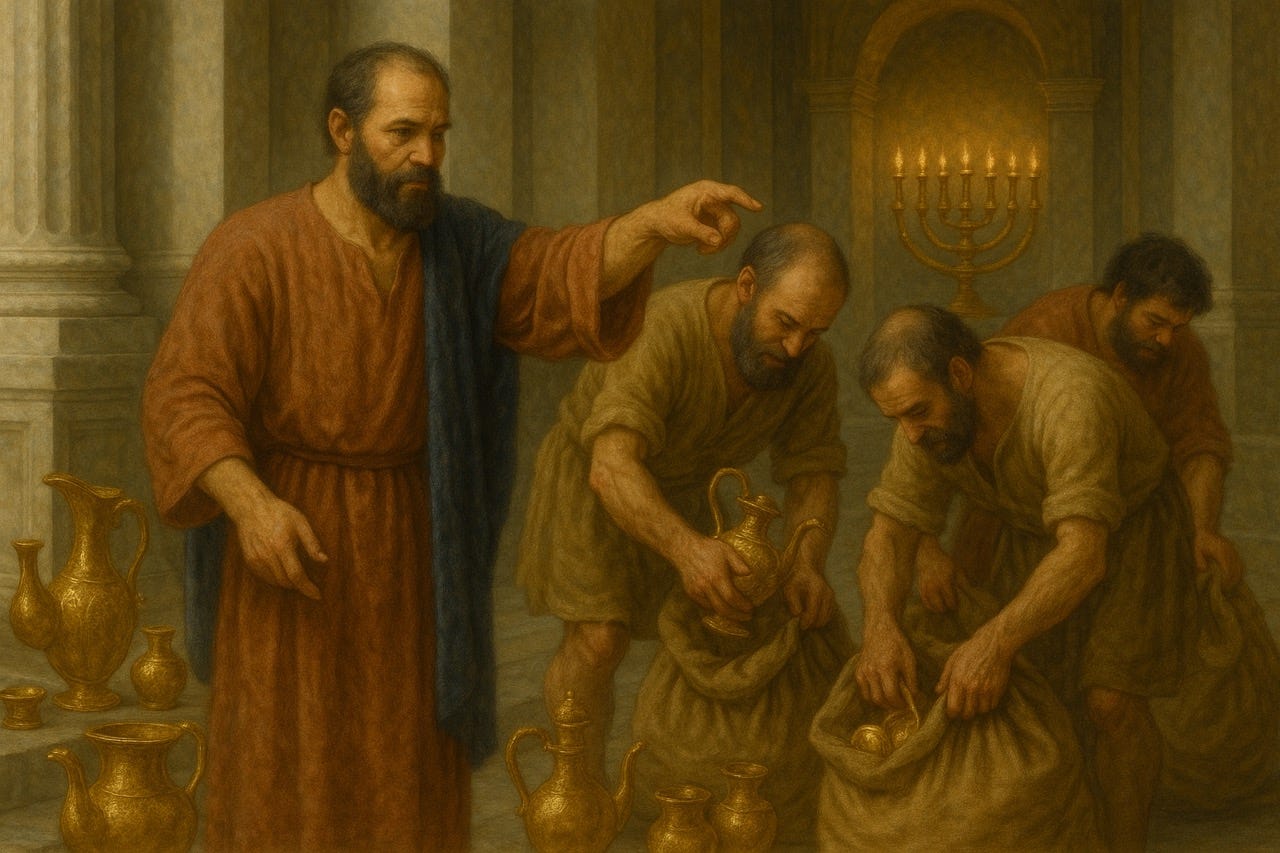Diving into Daniel: A Tax Collector, an Evil Ruler
Daniel 11:20-22; 2 Maccabees 3:24-40 - Are you disobedient to God? Perhaps you, too, can be called despicable.
““Then in his place one will arise who will send an oppressor through the Jewel of his kingdom; yet within a few days he will be shattered, though not in anger nor in battle. In his place a despicable person will arise, on whom the honor of kingship has not been conferred, but he will come in a time of tranquility and seize the kingdom by intrigue. The overflowing forces will be flooded away before him and shattered, and also the prince of the covenant.”
Daniel 11:20-22 NASB1995
Antiochus III was succeeded on the throne by his son Seleucus IV Philopator in 187 B.C. Because of the Treaty of Apamea between the Seleucid Empire and the Roman Republic, the Seleucid leaders were forced to pay large tributes to Rome after they ceded land. Seleucus IV Philopator sends a tax collector to Jerusalem to gather taxes and treasures. Here’s the background from Precept Austin:
In his place one will arise - Seleucus IV Philopator (187-175BC)
Will send an oppressor through the jewel of his kingdom - A tax collector.
Oppressor (05065) (nagas) is a verb which means to force someone to do something, as in this context where it refers to forcing someone to pay money (cf 2Ki 23:35).
Walvoord explains the reason for the taxation "Because of the rising power of Rome, he (Seleucus IV Philopator) was forced to pay tribute to the Romans of a thousand talents annually. In order to raise this large amount of money, Seleucus had to tax all the lands under his domain, including special taxes from the Jews secured by a tax collector named Heliodorus (2Macc 3:7) who took treasures from the temple at Jerusalem.
The AI image at the top shows Heliodorus directing the confiscation of items in the temple. Precept Austin recommends reading 2 Maccabees (in the Apocrypha) that tells an amazing supernatural story of Heliodorus. This excerpt is from Bible Hub and is in the New American Bible Revised Edition translation:
God Protects the Temple. 24But just as Heliodorus was arriving at the treasury with his bodyguards, the Lord of spirits and all authority produced an apparition so great that those who had been bold enough to accompany Heliodorus were panic-stricken at God’s power and fainted away in terror. 25There appeared to them a richly caparisoned horse, mounted by a fearsome rider. Charging furiously, the horse attacked Heliodorus with its front hooves. The rider was seen wearing golden armor. 26Then two other young men, remarkably strong, strikingly handsome, and splendidly attired, appeared before him. Standing on each side of him, they flogged him unceasingly, inflicting innumerable blows. 27Suddenly he fell to the ground, enveloped in great darkness. His men picked him up and laid him on a stretcher. 28They carried away helpless the man who a moment before had entered that treasury under arms with a great retinue and his whole bodyguard. They clearly recognized the sovereign power of God.
The Restoration and Testimony of Heliodorus. 29As Heliodorus lay speechless because of God’s action and deprived of any hope of recovery, 30the people praised the Lord who had marvelously glorified his own place; and the temple, charged so shortly before with fear and commotion, was filled with joy and gladness, now that the almighty Lord had appeared. 31Quickly some of the companions of Heliodorus begged Onias to call upon the Most High to spare the life of one who was about to breathe his last. 32The high priest, suspecting that the king might think that Heliodorus had suffered some foul play at the hands of the Jews, offered a sacrifice for the man’s recovery. 33While the high priest was offering the sacrifice of atonement, the same young men dressed in the same clothing again appeared and stood before Heliodorus. “Be very grateful to the high priest Onias,” they told him. “It is for his sake that the Lord has spared your life. 34Since you have been scourged by Heaven, proclaim to all God’s great power.” When they had said this, they disappeared.
35After Heliodorus had offered a sacrifice to the Lord and made most solemn vows to the one who had spared his life, he bade Onias farewell, and returned with his soldiers to the king. 36Before all he gave witness to the deeds of the most high God that he had seen with his own eyes. 37When the king asked Heliodorus what sort of person would be suitable to be sent to Jerusalem next, he answered: 38“If you have an enemy or one who is plotting against the government, send him there, and you will get him back with a flogging, if indeed he survives at all; for there is certainly some divine power about the place. 39The one whose dwelling is in heaven watches over that place and protects it, and strikes down and destroys those who come to harm it.” 40This was how the matter concerning Heliodorus and the preservation of the treasury turned out.
Fascinating story! According to Wikipedia, Heliodorus actually returned to Seleucus IV Philopator and likely assassinated the king, then declared himself regent. The assassination was probably done using poison in keeping with the prophecy (Seleucus IV Philopator was not shattered in battle or in anger). The true heir to the throne named Demetrius was being held hostage in Rome. Shortly after these events, Antiochus IV Epiphanes gains power (he returned to the Seleucid Empire in exchange for Demetrius) and deposes Heliodorus and reigns as co-regent with a child king (whom he later assassinates).
We first met this despicable and viciously antisemitic character in the prophecy in Daniel 8. He is considered a foreshadowing of the antichrist yet to come. Here is some great commentary from Precept Austin on verse 21:
A despicable person - Antiochus IV Epiphanes (175-164BC) What a contrast is God's view (despicable) versus his narcissistic view (Epiphanes = shine upon ~ glorious one).
Despicable (0959)(bazah) means to show contempt for someone or something, to view with disdain or to despise. Antiochus was indeed despised by the Jews. It is from a root meaning to accord little worth to something and means to disdain or to hold in contempt. Bazah is used in a number of places to mean “despise” in the sense of treating someone or something as totally insignificant or worthless. The basic meaning of the root is "to accord little worth to something." While this action may or may not include overt feelings of contempt or scorn, the biblical usage indicates that the very act of undervaluing something or someone implies contempt. Bazah means to raise the head loftily and disdainfully, to look down one's nose at something (so to speak)! The idea is that one undervalues something or someone which implies contempt for that thing or person (in this case God's Name in Mal 1:6 and here His table/altar, the place He is to be worshipped, revered, and adored! Woe!) Lest we be too hard on these ancient Israelites, let us "moderns" consider what we do EVERY TIME we willfully sin against God! Are you as convicted as I am! In fact Larry Richards writes that "Disobedience and other sins are portrayed in the OT as nothing less than evidences that we despise God. When we disobey, we show that we place little value on the Lord."
He will come in a time of tranquility - Either the people or the leaders felt secure and were at ease, suggesting Antiochus came when there was a sense of false security. In Daniel 8 we read that Antiochus Epiphanes "will destroy many while they are at ease (salwah)." (Da 8:25-note) (NLT - "defeating many by catching them off guard")
Tranquility (07962) (salwah) means security, prosperity, lack of anxiety or concern. Salwah occurs 8x in 8v - Ps 122:7; Pr 1:32; 17:1; Jer 22:21; Ezek 16:49; Da 8:25; 11:21, 24. NAS = complacency(1), ease(2), prosperity(2), quietness(1), time of tranquility(2).
Wikipedia…He assumed divine epithets, which no other Hellenistic king had done, such as Theos Epiphanes ("God Manifest") and after his defeat of Egypt, Nikephoros ("Bearer of Victory"). But his often eccentric behavior, capricious actions and even insanity led some of his contemporaries to call him Epimanes ("The Mad One"), a word play off of his title Epiphanes. (Reference)
Honor of kingship - Antiochus was not the rightful heir to the throne.
Seize the kingdom by intrigue - Antiochus was a master of "political intrigue." As the son and a potential successor of King Antiochus III, Antiochus became a political hostage of the Roman Republic following the Peace of Apamea in 188 BC. When his older brother, Seleucus IV Philopator (187-175BC) followed his father onto the throne in 187BC, Antiochus was exchanged for his nephew Demetrius I Soter (the son and rightful heir of Seleucus). After King Seleucus was assassinated by Heliodorus, a usurper, in 175BC, Antiochus in turn ousted him. Since Seleucus' true heir, Demetrius I Soter, was still a hostage in Rome, Antiochus, with the help of King Eumenes II of Pergamum, seized the throne for himself, proclaiming himself co-regent for another son of Seleucus, an infant named Antiochus (whom he then murdered a few years later). (Reference)
The commentary about despising God when we willfully sin is sobering!! You may think you are not being despicable or are not actively despising the Creator of the Universe, but when you casually or even automatically use His name in vain or jump willingly into sin against his precepts, that is despicable! This evil and despicable (Antigod) man came into the Beautiful Land in a time of relative tranquility, which is also a precautionary note. Don’t be lulled into a false sense of security!
The final verse in this passage says this:
The overflowing forces will be flooded away before him and shattered, and also the prince of the covenant.”
So what does this mean? Here is commentary for this verse from Precept Austin:
The overflowing forces will be flooded away (engulfed, swept away) before him - Describes the military victories of Antiochus IV Epiphanes over his enemies.
Prince of the covenant (berit/berith/beriyth) - NET = "a covenant leader will be destroyed." The identity of this individual is debated. Some commentaries favor this as reference to the "shattering" (murder) of the high priest Onias III who Antiochus Epiphanes ordered in 172BC. Others feel this represents Ptolemy VI Philometor who was defeated by Antiochus' forces.
Walvoord notes that "The high priest bore the title “prince of the covenant” because he was de facto the head of the theocracy at that time. In Da 11:28 and Da 11:32 the “covenant” is used for the Jewish state.
My next devotional examines Daniel 11:23-25 - The despicable one practices deception and goes up against the King of South.
Heaven on Wheels Daily Prayer:
Dear Lord - I pray that I do not act in a despicable way and show contempt for You by willfully sinning or being disobedient. Please help me to know that times of tranquility are not necessarily times of peace and evil can overcome us in an instant. Amen.
Scripture quotations taken from the (NASB®) New American Standard Bible®, Copyright © 1960, 1971, 1977, 1995 by The Lockman Foundation. Used by permission. All rights reserved. lockman.org
Precept Austin was accessed on 6/2/2025 to review commentary for Daniel 11:20-22.
Biblehub.com was accessed on 6/2/2025 to review 2 Maccabees 3.




